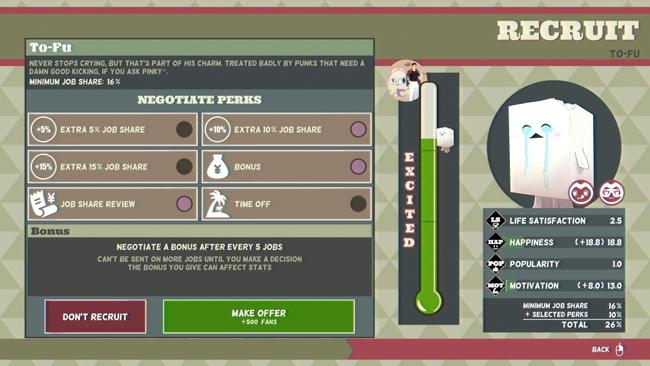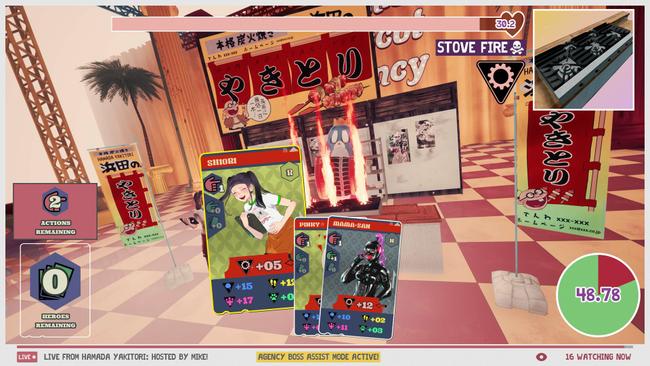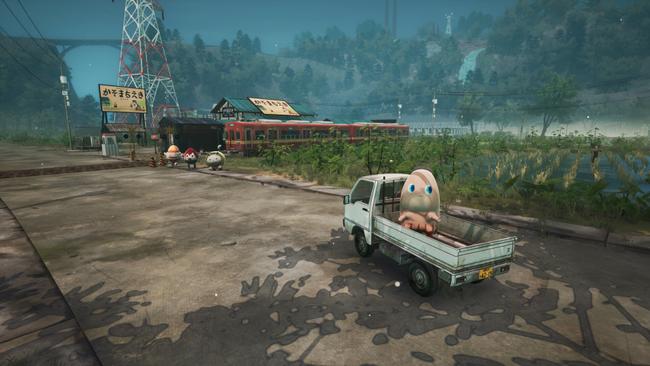
Promise Mascot Agency Review
At times, it can be a challenge deciding where to draw a line when it comes to what games we cover, as a genre outlet, and Promise Mascot Agency is no different. When we had the chance to demo the game at an ID@Xbox event adjacent to GDC last month, however, we decided that the game was close enough to our wheelhouse to warrant a closer look. RPGs are basically resource management games, after all, and resource management is part and parcel of what makes Promise Mascot Agency tick.
As the name suggests, Promise Mascot Agency is a game that revolves around managing a booking agency for mascots - specifically, anthropomorphized versions of the same mascots that are prevalent in Japan. Kaizen Game Works' version of Japan, mascots aren't just people in suits - but something more akin to Yokai, each with their own unique and supernatural talents. Except most of the mascots you'll be recruiting are deliberately of a rougher variety than you might expect; a vivisected eel that lives in horror of Japan's obsession with unagi even as the populations plummet, a cat fused with a yam that has a penchant for adult video, and much more. They're still cute designs in their unconventional way, and it's those charm points that determine which mascots you can send out on each job.

While at the start of the game simply getting into the groove of finding mascots, sending them on jobs, finding or buying upgrades to improve your agency and more is fairly straightforward - the whole story reason for why you're running a mascot agency is that you, Michizane, are an exiled Yakuza who must help gather up as much money as you can to make up for a job gone wrong that lost your Yakuza family 12 billion yen. Once the game assumes you're acclimated to the gameplay loop, you'll have to keep an eye on a meter that determines exactly how much wiggle room your family has to keep themselves from getting extinquished - which can only be extended by regularly sending cash directly their way through ATMs placed at regular locations in Kaso-Machi. Of course, try as you might it's impossible to fully repay that debt - so your real goal is to explore the island, talk with locals, and figure out the context for the grand conspiracy you've gotten wrapped up in.
In other words - managing your agency, like everything else in the game, is ostensibly about buying yourself some leeway. While you have very little control over what a mascot will do while out in a job, by traveling around Kaso-Machi in your Kei truck you can find any number of useful items. Gather cash by helping clean up the dilapidated town by ramming into the neon-pink bags of trash scattered over every corner of the island, purchase items that can be sent with a mascot on a job to help their chances of avoiding a rough situation, and even find car upgrades that can make getting around town that much easier.

Of course, while sending out a mascot on a job is no guarantee that something will go wrong - especially as you gain fans, allowing you to tackle tougher jobs with a higher payout and yet an equally harsher difficulty if things go wrong, the only way to salvage your maximum payout is to send Mascot Support Heroes to help. Mascot Support Heroes are represented as cards that you can find lying around Kaso-Machi, buy from vendors, and receive as rewards for interacting with an NPCs' Town Quest. Maybe you need to chase down an Idol group's exclusive merch that they've hidden around their hometown's vending machines, or you have to track down all of the island's various shrines. Maybe you need to simply help as many people as you can, and make a difference. The more you help each character, the stronger their Support Hero cards become.
Unfortunately once you find yourself in a rough state and a mascot requests your help, the actual level of control you can manage is rather limited. You don't build preset decks out of your Support Heroes, and while certain mascots have affinities to specific events - there's nothing really stopping you from using any mascot that qualifies, and having Support Heroes usually pick up the slack. Especially once you gather all the car upgrades and have unlocked fast travel points across the map, any tension the game has dissipates almost immediately. Even brand new, untrained mascots can tackle the game's most grueling jobs without much trouble as soon as you've done the legwork to find discarded old arcade games, or fished out kitchen knives, or any of the other objectives the game showers you with.

This isn't a bad thing, per se, but it means that although specific heroes have their strengths - not only does success feel more like it comes down to chance, once you've upgraded cards so they'll grant you more actions and draw more heroes from your collection, it becomes very easy for things to snowball. Failure itself doesn't even mean a loss of money; you still get a minimum guarantee. While you do have to negotiate salaries with your mascots when recruiting them, it doesn't feel like it matters all that much either way; sure if you stiff a mascot they'll run into trouble more often, and if you don't they'll take more of a cut of your profits, but without the risk either way you're spamming jobs back to back regardless. Since you're forced to wait for jobs to finish regardless, you're always going to be spending the time between jobs engaging with the same objectives that will make jobs become increasingly trivial over time.
Mindlessly driving, sailing and gliding your truck across the island to discover new mascots and engaging with the checklist is fun. While the game's driving controls are clunky, it feels intentional in a way that matches up with the rest of the game's charm; the little side stories revolving around each of the game's characters are maybe a little saccharine, even to the point of glorifying the Yakuza in a way that's perhaps a little uncomfortable to my taste, yet I still enjoyed what the game's story ultimately was. I'd wager that while I had fun with the game overall, part of what I'd hoped the game offered at the beginning was a mechanically-dense resource management sim where I have to carefully plan out my actions step-by-step, and while that's certainly how it looks like things will head at the start, in the end the game's actual gameplay mechanics feel like set dressing. It's essentially an excuse to get you out and about driving a Kei truck through a fictional Japanese town. There's nothing wrong with that, and we do cover games that veer towards narrative experiences, but I can't shake the feeling that Promise Mascot Agency wasn't quite what I'd signed up for - even if the end result was an enjoyable romp about reviving a town in its twilight years.